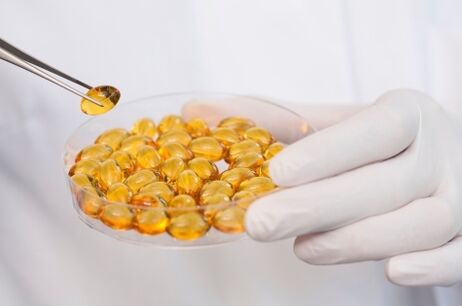What is lipoic acid? It is a pale yellow, bitter-tasting powder that can be easily confused with hundreds of other chemicals. However, the unique properties of the unusual combination of fatty acid and sulfur make one pay more attention to lipoic acid: it promotes weight loss, gives the body extra energy, protects the brain, and is probably the key that opens the door. to the land of eternal youth for mankind. . . Are you interested?

Lipoic acid is sometimes known to increase the effectiveness of exercise to lose weight. How else can you help your organization?
Lipoic acid: cleaner or special forces?
Lipoic acid, also known as LA, is also thioctic acid, it is also lipamide, also vitamin N, which often appears as a semi-vitamin or vitamin-like substance.
The fact that LA is synthesized by the human body has prevented it from becoming a "complete" vitamin. Interestingly, lipoic acid is also soluble in fat and water, while its other colleagues in "vitamin activity" boast a single comfortable habitat.
Lipoic acid is the real Figaro: here it is, there it is. By monitoring the enzymatic reactions that take place in mitochondria, it helps to make the energy acquisition process of cells as efficient as possible.
Lipoic acid molecules - miniature recycling plants. The substance "picks up" the breakdown products of amino acids and allows us to squeeze out the absolute maximum of the substances our body needs and then remove all the "waste" from the body.
In recent years, doctors have begun to talk seriously about lipoic acid as an elixir of eternal youth, as this substance has been shown in experiments to prevent DNA damage, which is recognized as the real cause of cell aging and extinction. vital functions.

Lipoic Acid And Weight Loss: Why It Works
Lipoic acid is able to "tame" the forces that cause us to gain weight and retain excess fat. Its activity in this quality is varied. So when you lose weight, lipoic acid:
affects the areas of the brain responsible for appetite, reduces hunger;
stimulates energy consumption;
increases insulin sensitivity;
qualitatively improves the absorption of glucose by cells, reducing its level in the blood;
reduces the tendency of the liver to accumulate fat.
Practice shows that lipoic acid gives the best results in weight loss combined with dietary changes and physical activity. There is a logical explanation for this. By "changing the course" of the diet, there are chemical changes in the body (following the most pronounced protein, paleo- or keto-diet, which give the fastest results and the most noticeable side effects), as well as increased strength, respectively. cardio exercises, microtraumas occur in the muscles.
As a result, oxidative processes in the body intensify, causing the formation of free radicals, damaged molecules, to "push".
So lipoic acid is not only able to neutralize, but also absorb, then - it recovers and rushes into the fight against antioxidants again.
This is another unique quality of lipoic acid: it is the only "reusable" antioxidant.
In addition, vitamin N has a friendly attitude: lipoic acid is able to interact with other substances that fight free radicals (vitamins C and E, as well as glutathione) and even enhances the effect of its allies.
Is alpha-lipoic acid the first?
For the first time, researchers were able to extract lipoic acid from beef liver cells in the 1950s. Therefore, alpha-lipoic acid began its "medical career" as a hepatoprotector for weight loss. However, scientists have discovered more and more new properties in an amazing material and have also learned to synthesize it quite qualitatively under laboratory conditions.
Today, chemists produce two chemically "mirror-like" versions of lipoic acid for different purposes - Rt ("right isomer") and St ("left isomer"). and almost completely.
The latest methods make it possible to achieve a higher purity of the drug and a high concentration of R-lipoic acid. It is clear that such a substance has great potential for all the properties inherent in LA, and the R-isomer has been shown experimentally to increase the insulin sensitivity of cells. However, the production of the pure R version of the material is quite expensive, which of course affects the cost of the product.

The most popular is the more affordable alpha-lipoic acid, in which the "right isomer" and the "left isomer" are in equal proportions.
Products containing natural lipoic acid
Guts: kidney, heart, liver;
Vegetables: broccoli, spinach, brussels sprouts, peas, tomatoes;
Other sources: brewer's yeast, brown rice.
When the fortress is not enough
Many living organisms (including humans) are able to synthesize certain amounts of lipoic acid on their own - this explains the fact that high concentrations of this beneficial substance are found in the internal organs of animals.
Unfortunately, we don’t have to rely entirely on LA’s food sources: as Dr. Jeffrey Webb, an American specialist in functional nutrition, explains, our enzymes are unable to "break" the link between alpha-lipoic acid and the lysine amino acid that circulates lipoic acid into the gastrointestinal tract. Therefore, from an ALA-rich dinner, we only get crumbs of the precious material.
The question arises: if people can produce lipoic acid only in modest amounts and get even less with food than we have ever lived until doctors have learned to synthesize it?
The answer is simple: happy organisms that do not suffer from metabolic disorders, are not prone to obesity, and have not accumulated the full amount of free radicals are able to exist with the amount of free alpha-lipoic acid. But the deterioration of the ecological situation and the rapid deterioration of eating habits in the 21st century has brought lipoic acid out of the shadows.
If you need help with a substance that is both an antioxidant, a water-soluble and fat-soluble vitamin, it stimulates lipid metabolism and, as a bonus, protects against degenerative brain diseases - talk to your doctor about taking this medicine. additional alpha-lipoic acid as a dietary supplement.
Lipoic acid: how much to take
Your doctor's general recommendation is 25-50 mg alpha-lipoic acid daily as a support and tonic. But this can vary depending on the purpose for which the vitamin-like substance is used and the health of the "farmer".
For those who exercise to lose weight, 100-200 mg of alpha-lipoic acid is "eaten", often as part of complex preparations that also contain L-carnitine (levocarnitine). LA enhances the "fat burning" of this natural anabolic. effect.
It should be borne in mind that such food supplements should be taken at strictly limited intervals so that the body is not "accustomed" to a constant intake of metabolic stimulants and does not cause a withdrawal syndrome that is fraught with rejection. to produce these substances on their own.
Because lipoic acid is able to maintain the action of insulin and take over some of its functions in certain processes and reactions, diabetics are often prescribed higher doses, starting with 400 mg of LA per day.
David Perlmutter, the author of the famous neuroscientist The Brain Nutrition Diet, says a mandatory intake of 600 mg of alpha-lipoic acid is mandatory for anyone interested in preventing neurodegenerative diseases and eliminating the consequences of years of rapid carbohydrate intake.
In recent U. S. experiments, alpha-lipoic acid at a dose of 1, 800 mg daily for 20 weeks helped 9% lose weight in severely obese patients without changing their diet.
In case you decide to spend money on the more progressive and expensive R-isomer of lipoic acid, the dose should be halved due to the high bioavailability.
It should be noted that despite all the benefits of lipoic acid, overdose can cause indigestion and nausea, increased skin sensitivity and muscle pain, and a severe drop in blood sugar along with the associated "surprises" such as weakness, dizziness and severe hunger.
Therefore, be sure to consult your doctor before rushing to the pharmacy for a huge box of lipoic acid for rapid weight loss: a specialist will help you determine the dose that is effective and safe for you, lean and healthy.
Alcohol is strictly contraindicated throughout the duration of taking lipoic acid. For best absorption, the supplement should be taken 60 to 30 minutes before or at least one hour after a meal.
The noticeable and tangible results of taking the substance appear after eight weeks at the earliest.































